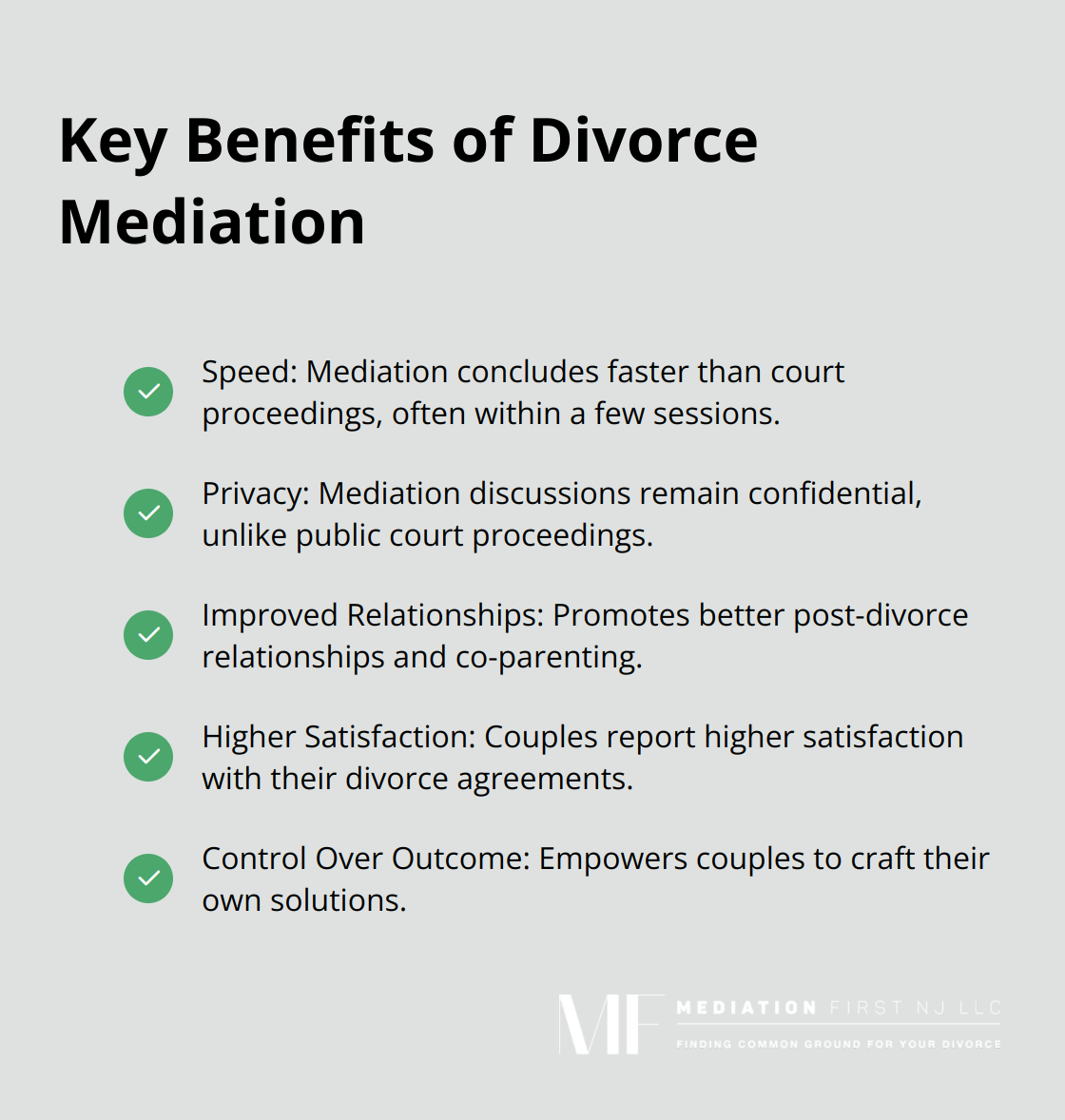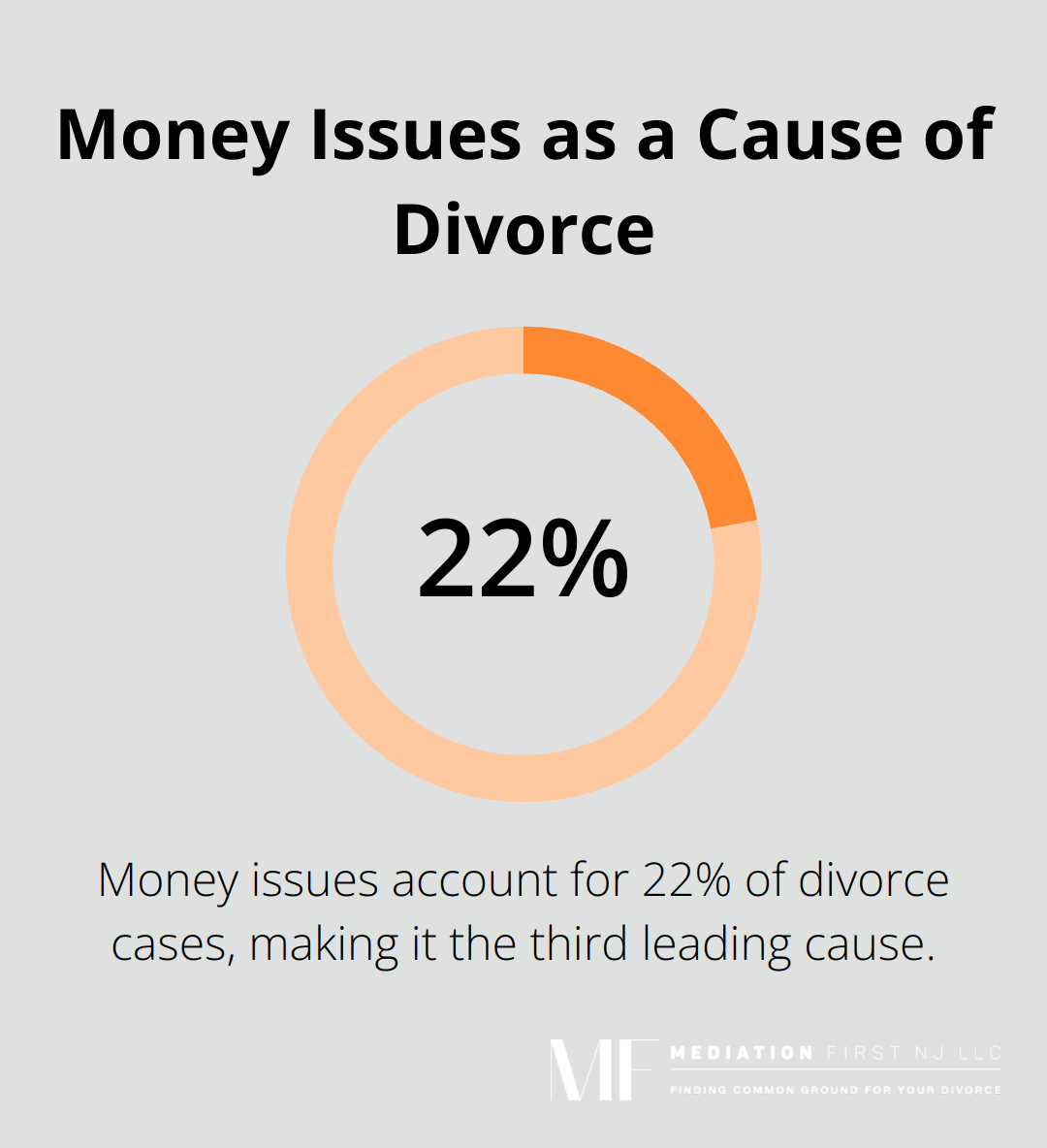Divorce is often seen as a contentious process, but it doesn’t have to be. At Mediation First NJ LLC, we believe in a more peaceful approach.
Divorce through mediation offers couples a collaborative way to end their marriage while maintaining respect and open communication. This alternative method can lead to faster, less expensive, and more amicable resolutions.
What Is Divorce Mediation?
The Collaborative Approach
Divorce mediation presents a cooperative process where separating couples work with a neutral third party to resolve their disputes. One of the key benefits of mediation is flexibility. The process allows couples to work together at their own pace and develop solutions that suit their unique situation.
The Mediation Process Explained
The mediation process typically involves several sessions where both parties meet with a mediator. This professional facilitates discussions on key issues such as asset division, child custody, and support arrangements. Unlike court proceedings (where a judge makes decisions), mediation empowers couples to craft their own solutions.
Mediation vs. Traditional Litigation
Traditional divorce litigation often pits spouses against each other in a win-lose scenario. This adversarial approach can escalate tensions and drain emotional and financial resources. In contrast, mediation focuses on finding mutually beneficial outcomes.
Advantages of Choosing Mediation
Opting for mediation offers numerous advantages:

- Speed: Mediation concludes faster than court proceedings. While litigation can extend for months or even years, mediation often wraps up within a few sessions. This efficiency not only saves time but also reduces stress on all parties involved (including children).
- Privacy: Court proceedings become public record, but mediation discussions remain confidential. This confidentiality allows couples to discuss sensitive matters openly without fear of public exposure.
- Improved Relationships: Mediation promotes better post-divorce relationships. As couples learn to communicate effectively during the process, they often find it easier to co-parent and interact positively after the divorce finalizes. This improved relationship can have lasting benefits, especially for families with children.
Couples who choose mediation often report higher satisfaction with their divorce agreements. They feel heard, respected, and in control of the outcome, which can lead to more durable agreements and smoother transitions into post-divorce life.
As we move forward, let’s explore the crucial role that a skilled mediator plays in guiding couples through this process and ensuring a fair and balanced outcome for all parties involved.
What Does a Divorce Mediator Do?
Facilitating Effective Communication
A divorce mediator creates a safe, non-judgmental environment where both parties can express their needs and concerns openly. They use active listening techniques and ask clarifying questions to ensure each spouse fully understands the other’s perspective.
For example, when discussing child custody arrangements, a mediator might encourage each parent to articulate their ideal schedule and the reasoning behind it. This approach often leads to creative solutions that might not have been considered in a more adversarial setting.
Navigating Complex Financial Matters
Divorce mediators assist couples in navigating complex financial issues. They help identify and categorize all marital and separate properties and debts, ensuring both parties have a clear understanding of their assets and liabilities.
Maintaining Neutrality and Fairness
Mediators must remain impartial and ensure that both spouses have an equal voice in negotiations. Unlike attorneys in litigation, a mediator does not take sides or make legal decisions. Instead, they help couples navigate the divorce process in a way that promotes fairness and mutual understanding.

To maintain fairness, mediators often use a technique called “reality testing.” This involves asking probing questions to help each spouse consider the long-term implications of their decisions. For instance, if one spouse insists on keeping the family home, the mediator might ask how they plan to manage the mortgage and maintenance costs on a single income.
Drafting the Mediation Agreement
Once the couple reaches an agreement on all issues, the mediator drafts a comprehensive mediation agreement. This document outlines all the terms agreed upon during the mediation process (including property division, child custody arrangements, and any support payments).
It’s important to note that while mediators can draft this agreement, they cannot provide legal advice. Many mediators recommend that each spouse have the agreement reviewed by their own attorney before signing.
A skilled mediator transforms a potentially contentious divorce into a collaborative problem-solving process. This approach not only leads to more satisfactory outcomes but also sets the stage for better post-divorce relationships. In the next section, we’ll explore the key issues that are typically addressed during divorce mediation.
What Issues Does Divorce Mediation Address?
Divorce mediation tackles a wide range of complex issues. We guide couples through these complex matters, ensuring a comprehensive resolution.
Dividing Assets and Debts
One of the most challenging aspects of divorce is the division of marital property. In New Jersey, the law requires an equitable distribution of assets and debts. This doesn’t necessarily mean a 50/50 split, but rather a fair division based on various factors.
During mediation, we help couples create a detailed inventory of their assets and debts. This includes real estate, retirement accounts, investments, and personal property. We also address outstanding mortgages, credit card balances, and other liabilities.
A study by the Institute for Divorce Financial Analysts found that money issues are the third leading cause of divorce, accounting for 22% of cases. Addressing these matters head-on in mediation allows couples to avoid prolonged conflicts and achieve a fair settlement.

Creating Child Custody and Parenting Plans
For divorcing parents, determining child custody arrangements often becomes the most emotionally charged issue. Mediation provides a platform for parents to collaboratively create a parenting plan that serves the best interests of their children.
We encourage parents to consider factors such as school schedules, extracurricular activities, and each parent’s work commitments when crafting their parenting plan. The goal is to create a schedule that minimizes disruption to the children’s lives while ensuring meaningful time with both parents.
Research from the Journal of Family Psychology shows that children whose parents use mediation experience less stress and anxiety compared to those whose parents litigate. This underscores the importance of a cooperative approach in custody matters.
Determining Support Arrangements
Spousal and child support are critical components of many divorce settlements. In mediation, we help couples understand New Jersey’s support guidelines and how they apply to their specific situation.
For child support, we consider factors such as each parent’s income, the amount of parenting time, and the children’s needs. Spousal support discussions involve examining the length of the marriage, each spouse’s earning capacity, and the standard of living established during the marriage.
A report from the U.S. Census Bureau indicates that only 43.5% of custodial parents receive the full amount of child support due. Through mediation, we try to create sustainable support agreements that both parties can commit to, increasing the likelihood of consistent payments.
Navigating Complex Financial Situations
Some divorces involve complex financial situations that require special attention. This might include family-owned businesses, significant investment portfolios, or international assets.
In these cases, we often recommend bringing in financial experts to provide valuations and tax implications. This ensures that both parties have a clear understanding of their financial landscape before making decisions.
The American Bar Association reports that mediation can reduce the cost of divorce by 50-70% compared to litigation. This cost-saving is particularly significant in complex financial cases where litigation expenses can quickly escalate.
Final Thoughts
Divorce through mediation transforms the end of a marriage into a cooperative process. This approach reduces costs, speeds up resolution, and improves communication between parties. Couples who choose mediation maintain control over their divorce outcomes and create tailored solutions for their unique circumstances.
Mediation sets the stage for effective co-parenting and future interactions. Ex-spouses learn to communicate and negotiate during the process, which prepares them to handle future challenges. This collaborative foundation leads to smoother transitions and fewer conflicts in the long run.
Mediation First NJ LLC offers professional mediation services to guide couples through divorce in New Jersey. Their approach fosters constructive communication and collaboration, helping clients reach mutually acceptable agreements outside of court. Mediation First NJ LLC empowers couples to make informed decisions that serve their best interests (and those of their children).

